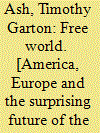| Srl | Item |
| 1 |
ID:
146306


|
|
|
|
|
| Summary/Abstract |
IN FEBRUARY 2016, Foreign Minister of France Laurent Fabius left his post after nearly four years in office; this rekindled the discussion about France's foreign policy and its steadily declining international significance. When in the late 1950s General de Gaulle presented his foreign policy doctrine to the nation it looked as if there were no alternatives to it. Georges Pompidou, the general's top ally, minced no words: "No French government can pursue a policy different from that of de Gaulle. It might be differently formulated but the essence will remain the same."
|
|
|
|
|
|
|
|
|
|
|
|
|
|
|
|
| 2 |
ID:
058052


|
|
|
|
|
| Publication |
New York, Random House, 2004.
|
| Description |
xiv, 286p.Hbk
|
| Standard Number |
1400062195
|
|
|
|
|
|
|
|
|
|
|
|
Copies: C:1/I:0,R:0,Q:0
Circulation
| Accession# | Call# | Current Location | Status | Policy | Location |
| 048953 | 909.09821083/ASH 048953 | Main | On Shelf | General | |
|
|
|
|
| 3 |
ID:
153048


|
|
|
|
|
| Summary/Abstract |
The failed expedition of Suez in 1956 and France’s subsequent strategic ‘divorce’ from the United Kingdom and the United States lies at the heart of a policy paradigm that has dictated France’s defence posture from de Gaulle’s presidency to the end of the Cold War. Some crucial features of the Gaullist posture remain today enduring references for French presidents in the definition of France’s exceptionalism. While it is so, there have been significant changes since the 1990s when it comes to France’s strategic relations with the United States and the United Kingdom. This article demonstrates the extent and mechanisms of this rapprochement by analysing it through three dimensions of policy change: modes of action, institutional commitments and discourses. The article demonstrates the dimensions’ mutually reinforcing effects and argues that France’s exceptional posture has de facto been reversed.
|
|
|
|
|
|
|
|
|
|
|
|
|
|
|
|
| 4 |
ID:
153049


|
|
|
|
|
| Summary/Abstract |
France’s so-called exceptionalism in multilateral security policy is often explained with its Gaullist political culture. However, a closer look shows that Gaullism cannot easily capture different French policies, particularly toward NATO. To unearth what can explain policy variance, this paper asks the question of whether French political parties value NATO differently and, if so, to what effect? Looking at French governments from 1991 to 2014, I argue that political parties in France carry different values, which lead them to interpret NATO’s role for France’s security policy differently. As a result, French parties in power encouraged, delayed, or halted NATO institutional transformation at specific junctures. This argument builds on the insights of the study of ideational factors in IR and the study of party politics in Comparative Politics. Through an analysis of French governments’ policy preferences toward NATO, this paper stresses that institutional transformation can be understood through the study of veto points in conjunction with national preference formation.
|
|
|
|
|
|
|
|
|
|
|
|
|
|
|
|
| 5 |
ID:
153047


|
|
|
|
|
| Summary/Abstract |
This article introduces the key tenets of French foreign and security policy during the Cold War, and illustrates the deep challenges to the French consensus raised by the emergence of a unipolar system. There is a growing gap between the rhetoric of French security policy, emphasizing ‘autonomy’ and ‘sovereignty’ out of habit from the Cold War, and the actual security practices showing a gradual embedding within the transatlantic security structures. In the absence of a new transpartisan grand narrative relevant for the contemporary international system, such embedding is easily portrayed in France as a ‘treason’ from a romanticized Gaullist foreign policy.
|
|
|
|
|
|
|
|
|
|
|
|
|
|
|
|